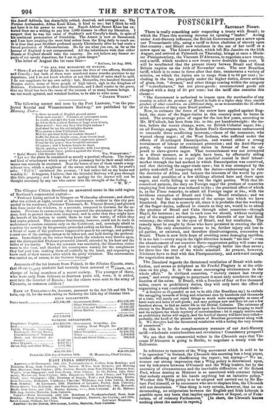POSTSCRIPT.
SATURDAY NIGHT.
There is really something astir respecting a treaty with Brazil ; to which the Times this morning devotes its opening " leader." Acting under Anti-Slavery influence, the British Government put a screw upon
our Transatlantic ally, using a tariff to force abolition of slavery upon that country ; and Brazil now retaliates in the use of her tariff as a screw upon us. The Linnet packet, which left Rio Janeiro on the 25th August, and arrived at Falmouth on Thursday, brings at once a Minis- ter Plenipotentiary, the Viscount D'Abrantes, to negotiate anew treaty,
and a tariff, which renders a new treaty more desirable than ever. It will be recollected that the present treaty betwen Brazil and Great Britain expires on the 10th of November next. The new Brazilian
tariff, which is to come in force after that date, enumerates a variety of articles, on which the duties are to range from 2 to 60 per cent in- cluding in the list, principally under the higher duties, divers articles
of glass, iron, "dresses," and other things coming within the category of "manufactures," but not piece-goods : nnenumerated goods are charged with a duty of 30 per cent: but the tariff also contains this clause- " The Government is authorized to impose upon the merchandise of any country in which the produce of Brazil is liable to a higher duty than similar produce of other countries, an additional duty, so as to neutralize the ill effects of the difference of duty upon Brazil produce."
Now, to estimate the force of the screw here applied against Eng- land, the state of the Sugar-duties in this country must be borne in mind. The average price of sugar for the last few years, according to Mr. M'Culloch, has been from 24s. to 34s. per hundredweight: the du- ties, before the recent change, were, on British Colonial sugar, 24s.; on all Foreign sugars, 63s. Sir Robert Peel's Government endeavoured to reconcile three conflicting interests,—those of the consumer, who wanted cheap sugar ; of the West Indians, who suffered under the effects of ill-arranged Emancipation, and wanted either a strong recruitment of labour or continued protection ; and the Anti-Slavery party, who wanted differential duties in favour of free as op- posed to slave-grown sugar. That reconcilement was not attempted in a direct manner, as it might have been, by effectually aiding the British Colonies to repair the mischief caused in their labour- market through the bad method in which Emancipation was contrived, and then throwing the sugar-trade open ; but it was attempted by the paltry makeshift of tampering with the duties—endeavouring to rule the destinies of Africa and balance the interests of the world by pre- miums and penalties of a few shillings allotted here and there upon sugar, and really falling to any but the right parties. With that ill- conceived purpose, the duty on Foreign sugar the produce of countries employing free labour was reduced to 34s.; the practical effect of which is, as the Times remarks, to admit all Foreign sugar at 34s., with the invidious exception of Brazil and Cuba. Brazil retaliates ; and we begin to feel the embarrassments of the scrape into which we have blundered. But that is scarcely all, since it is probable that the working of the Sugar-duties, suffered to remain as they are, would be to admit the produce of Brazil and Cuba through other countries—through Hayti, for instance ; so that in such case we should, without realizing any of the supposed advantages, have the discredit of our bad fiscal economy, the odium in the eyes of Brazil, and her retaliation. The remedy must be sought by those who have persisted in erecting the dif- ficulty. The only alternative seems to be, further injury and loss to all parties, or extorted, and therefore disadvantageous, concession tn Brazil. There is now little hope of avoiding some damaging sacrifice. It is too late /—every step in the right direction is made "too late"; even the abandonment of our coercive Slave-suppression policy will come too. late to realize all the good it might,—though better late than never ; for there lies the root of the whole mischief. At present, however, Ministers have to deal with this Plenipotentiary, and awkward enough the negotiation must be.
The Standard regards the threatened retaliation of Brazil with satis- faction, and seems as delighted as Sir Fretful Plagiary is at the criti- cism on his play. It is "the most encouraging circumstance in the whole affair." In civilized countries, "slavery cannot last twenty years," and every struggle to perpetuate it must only accelerate the ezor tiuction of the curse. If Brazil, with a frontier of four or five thousand miles, resort to prohibitory duties, they will only have the effect of organizing a vast contraband trade- " A frontier so ill guarded as not to be able (the Brazilians say) to exclude the smuggling inwards of living and reluctant men by hundreds and thousands at a time, will surely not reject things so much more manageable as cases of hard-ware and bales of soft goods; and may perhaps now and then let out a few hundred slaves, to find an easier life in the British Colonies. The existence of slavery in the Brazils, in fact, depends upon the Government keeping to itself and its subjects the whole mystery of contrabandism let it supply motive such as prohibitory duties will supply, and the knell of slavery willhave been tolled— probably, the knell of the present system of Brazilian government along with it. We therefore hail the threatened retaliation with a feeling the very reverse of uneasiness."
So this is to be the complementary measure of our Anti-Slavery tariff—wholesale contrabandism and revolution I Consolatory prospectl
We see that the commercial writer in the Chronicle says that Vis- count D'Abrantes is going to Berlin, to negotiate a treaty with the Zollvereio.


























 Previous page
Previous page